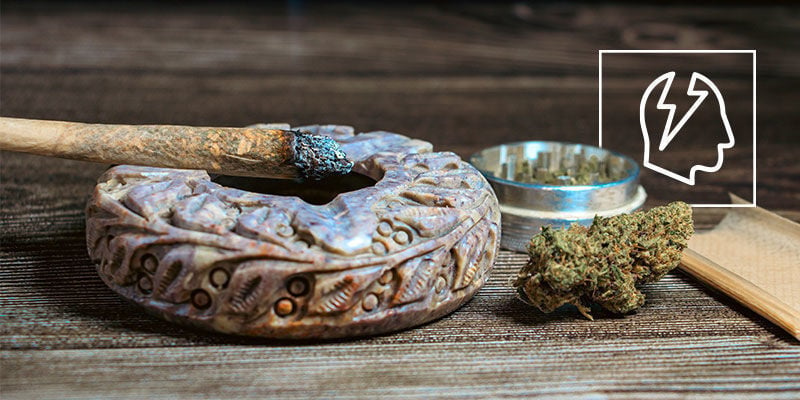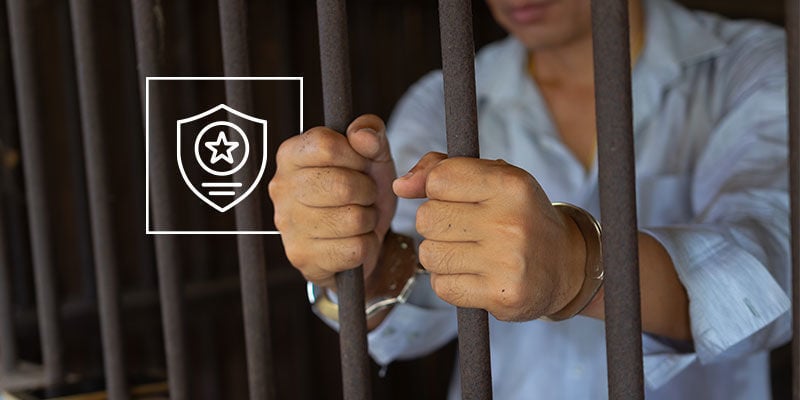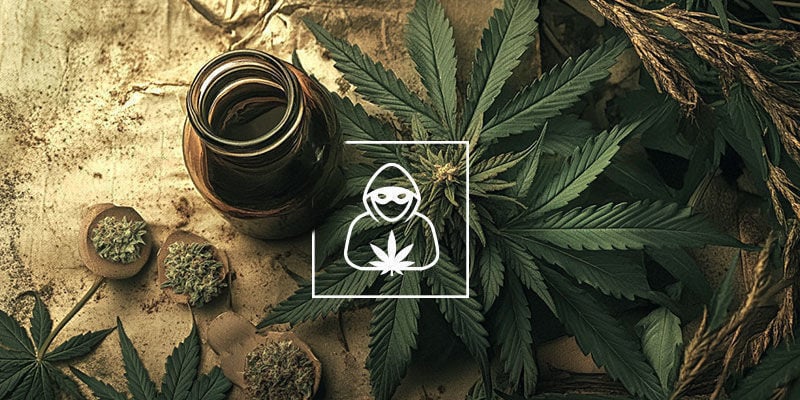
True Drug-Related Crime Stories: Cannabis
Growing and smoking weed might be fun or even therapeutic for many. However, the fact remains that cannabis is an illegal drug that, in the vast majority of the world, is produced, traded, and used illegally, and even associated with heinous crimes. Below, we explore some of the most notorious weed-related crimes.
For some, it's a great way to relax. For others, it's an important medicine. Cannabis is an age-old plant that's accompanied humans all over the globe for thousands of years. Nonetheless, cannabis is still prohibited or heavily regulated across the world. Given its illegality, the trade and use of cannabis are sometimes tied to some horrific crimes.
From millionaire kingpins to serial killers, this edition of True Drug-Related Crime Stories shines a light on some of the most storied and gruesome weed-related crimes. Keep reading to learn more about the dark side of cannabis.
The Dream Slayer

Before the Marihuana Tax Act of 1937, there was Reefer Madness, now considered a cult classic film. And before that, there was the story of the Tampa Dream Slayer, AKA Victor Licata. On October 16th, 1933, Licata hacked his parents and three siblings to death with an axe after dreaming they held him to the wall, taunting him as they cut off his arms and replaced them with wooden stumps and steel claws. The police and press were quick to report that cannabis and moonshine were to blame for Licata’s frenzied murder. And that’s all DEA head Henry Anslinger needed to fuel his anti-marijuana campaign, which effectively led to the prohibition of cannabis with the Marihuana Tax Act.
However, weed itself had little to do with the gruesome murder. Licata was known to be dangerous and unstable, and though police tried to have him committed a year prior to his murder, his family refused. His father, aware of his son’s instability, slept with a pistol under his pillow. After the information of his mental instability came to light, Licata was sentenced to life at a mental institute. His moniker (the "Dream Slayer”), however, lived on, as does the federal prohibition of cannabis across the US.
The killing pot smoker

On April 25th, 2022, Joshua Jacques called his mother saying he was going to make a sacrifice. That same night, he stabbed his girlfriend and three members of her family to death. When police found him, Jacques was naked in the bathroom, praying and screaming "Allah, take me now”, Kill me now", and "God please forgive me". Later, at a local hospital, he repeated that what he did was "a sacrifice".
Joshua had a long history of drug use, criminal behaviour, and mental health issues. He had admitted to using 2 g of cannabis a day, and some reports say he was using up to 3 g daily and consuming alcohol in the time prior to the murders. The courts found Jacques guilty of all four murders and sentenced him to 46 years in prison. Experts argued that he likely suffered temporary mania or psychosis caused by his drug and alcohol use.
The misleading cop

When Jari Aarnio started his career in the Helsinki Police Department in 1979, the fresh-faced Helsinkian showed lots of promise. Within his first 7 years on the force, Aarnio helped bring down famed local drug king Miika Kortekallio—an act that won him the award of Police Man of the Year in 1987. At the pinnacle of his career, Aarnio served as the head of Helsinki's anti-drugs squad.
In December 2016, however, Aarnio's career took a sharp turn—the police chief found himself at the centre of allegations of drug trafficking and corruption. Aarnio served in prison till June 2022 for helping an organised crime gang smuggle approximately 800 kilograms of hashish into the country, interfering with and misleading the investigation into the smuggling, and threatening a suspect. He was also convicted of fraud and corruption for holding a share in a company that sold surveillance equipment to the Helsinki Police Department, Finnish Customs, the National Bureau of Investigation, as well as the Foreign Ministry.
The hash “reverend”

Klaas Bruinsma is one of the most renowned figures of the Dutch underworld. Son of the founder of Raak, a famous Dutch soft drink manufacturer, Klaas etched out a very different life for himself—one of extravagant criminality. He made this decision at the tender age of 16 when he dropped out of high school to focus on dealing hashish. He quickly earned the nickname The Reverend for his all-black outfits and preachy nature.
Together with Thea Moear (another famed figure of the Dutch crime scene), Klaas built a huge international drug empire in seemingly record time. By the late 1970s, Klaas was regularly smuggling 5,000 kg of hashish into Europe from Pakistan, Lebanon, and Syria. At the peak of his career, his shipments came to be worth 450 million guilders (or €200 million). By the 1980s, his organisation was thought to be generating the equivalent of €225,000 a day. However, Klaas' operation eventually fell apart after he was outed in Het Parool, a Dutch newspaper, by the investigative journalist Bart Middelburg. Shortly after Middelburg's article was published, what was intended to be Klaas' final hash shipment was seized by police. He began using cocaine, and his operation slowly crumbled. In 1991, he was shot outside the Amsterdam Hilton by another organised crime gang member.
The first executed drug lord in the US

In 1988, the US government restored the use of the death penalty under the Anti-Drug Abuse Act. In 1992, Juan Raul Garza, a drug kingpin operating out of Brownsville, Texas, was sentenced to be the first man since 1963 to be executed by the US government. The son of Mexican migrant workers, Garza established an extremely profitable drug ring in the late 1980s and early 1990s that smuggled thousands of kilograms of cannabis into the US by land and aircraft.
As his shipments started to get intercepted by the police, Garza suspected that some of his men were working against him. This culminated in three murders—two ordered by Garza and executed by his henchmen, and one executed by Garza himself. It was these murders, in combination with his role as a leader of an underground drug ring, that earned him the death penalty under the 1988 Anti-Drug Abuse Act. Garza was found guilty in 1993 and despite some opposition to his death sentence (based on claims that the sentence was racially motivated), he was executed by lethal injection on June 19, 2001.
Cannabis-related crime: The other side of the coin

Used medicinally, spiritually, and even industrially, the cannabis plant has played a central role in the development of human societies everywhere. Nonetheless, weed has been at the centre of a fair few crimes. In this article, we've shone a light on some of the atrocities that occur in the underground world that, due to prohibition, continues to be the main stage for cannabis production and trade. What better incentive to legalize this ancient plant and bring its cultivation, trade, and use into a regulated, legal space?
-
 2 min
3 November 2023
Is The Hemp Industry At Risk?
As a multi-million-dollar industry, hemp in the US is big business. However, this isn't down to chance; in 2018, the Farm Bill was passed, allowing low-THC cannabis to be utilised in a wide variety...
2 min
3 November 2023
Is The Hemp Industry At Risk?
As a multi-million-dollar industry, hemp in the US is big business. However, this isn't down to chance; in 2018, the Farm Bill was passed, allowing low-THC cannabis to be utilised in a wide variety...
-
 4 min
11 January 2021
How To Relieve Tension With Cannabis
We all know that cannabis can help take a load off at the end of the day, and relieve tension. But what is the science behind this much sought after effect?
4 min
11 January 2021
How To Relieve Tension With Cannabis
We all know that cannabis can help take a load off at the end of the day, and relieve tension. But what is the science behind this much sought after effect?
-
 3 min
7 November 2018
Effect Of Cannabis On Your Body
Cannabis has many impacts on the body. Most of them are positive (both short and longer term). However, there are some negative side effects users should be aware of.
3 min
7 November 2018
Effect Of Cannabis On Your Body
Cannabis has many impacts on the body. Most of them are positive (both short and longer term). However, there are some negative side effects users should be aware of.
-
 2 min
29 January 2017
Regulation Spreading: Bilbao, Spain Set To Regulate Cannabis...
New cannabis regulation has been set for the Spanish city of Bilbao. Ganja connoisseurs from all around the globe are stoked! This new 420 destination has now become reality.
2 min
29 January 2017
Regulation Spreading: Bilbao, Spain Set To Regulate Cannabis...
New cannabis regulation has been set for the Spanish city of Bilbao. Ganja connoisseurs from all around the globe are stoked! This new 420 destination has now become reality.














 United States
United States










